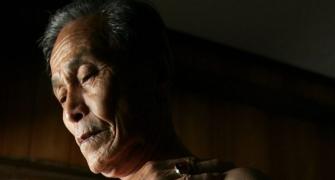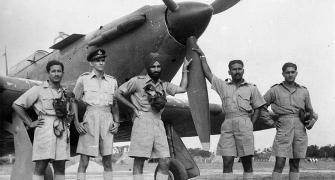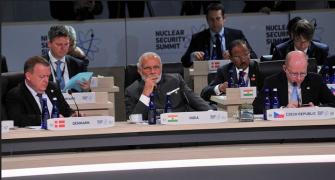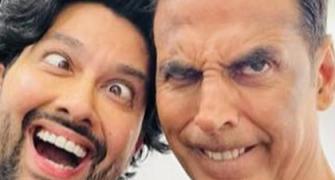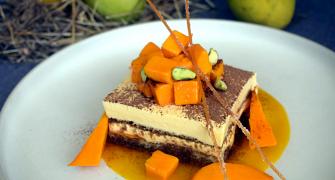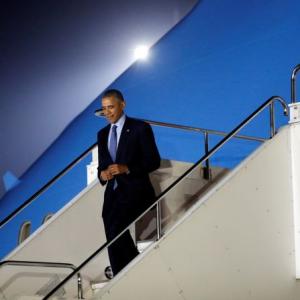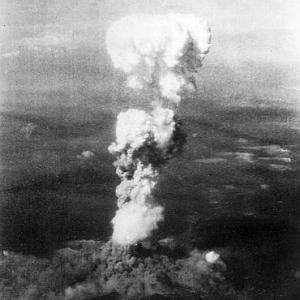
Barack Obama became the first sitting US president on Friday to visit the western Japanese city of Hiroshima, the site of the first atomic bombing ever at the end of World War II in 1945, a gesture that Washington and Tokyo hope will showcase their alliance and breathe life into stalled efforts to abolish nuclear arms.

Accompanied by Japanese Prime Minister Shinzo Abe, Obama lay flowers at the cenotaph in Hiroshima, which sits in the shadow of a domed building, whose skeleton has been left standing in silent testament to the victims of the first ever nuclear attack.
Families, schoolchildren, bomb survivors, a Buddhist monk and office workers stood in the 80-plus-degree weather, some for hours, to get a glimpse of Obama. Some expressed gratitude to the president for being the first to visit their city while in office, and many people were following the broadcast of the visit on their cellphones.

Writing in the Hiroshima guest book, Obama called for the courage to "spread peace and pursue a world without nuclear weapons."
"71 years ago, death fell from the sky and the world was changed," the president said after laying a wreath.
"Why did we come to this place, to Hiroshima? We come to ponder a terrible force unleashed in the not so distant past. We come to mourn the dead," he said.
"Their souls speak to us, they ask us to look inward, take stock of who we are," he said.
"Technological progress without equivalent progress in human institutions can doom us. The scientific revolution that led to the splitting of the atom requires a moral revolution as well.
"This is why we come to this place, we stand here, in the middle of this city and force ourselves to imagine the moment the bomb fell.

"We force ourselves to feel the dread of children confused by what they see. We listen to a silent cry."
Presidential aides say Obama's main objective in Hiroshima was to showcase his nuclear disarmament agenda.
Prior to his visit, Obama said he will honour all who died in World War II but will not apologize for the bombing of Hiroshima. The city of Nagasaki was hit by a second nuclear bomb on August 9, 1945, and Japan surrendered six days later.
"The dropping of the atomic bomb, the ushering in of nuclear weapons, was an inflection point in modern history,” Obama told reporters on Thursday in Japan.
“I do think that part of the reason I’m going is because I want to once again underscore the very real risks that are out there and the sense of urgency that we all should have,” Obama said. “It is not only a reminder of the terrible toll of World War II.”
"It is also to remind ourselves that the job’s not done in reducing conflict, building institutions of peace and reducing the prospect of nuclear war in the future."

The Hiroshima bombing decimated 90 percent of the city and killed 80,000 people on the spot. More died later from the effects of radiation, bringing the death toll to 140,000.
A majority of Americans see the bombings as having been necessary to end the war and save lives, although many historians question that view. Most Japanese believe they were unjustified.
The attack is no longer as present in the modern mind as it was during the decades of the Cold War, said Obama.
“But the backdrop of a nuclear event remains something that presses on the back of our imagination.”

“I want to once again underscore the very real risks that are out there and the sense of urgency that we all should have,” he told reporters.
"In a way, the less he (Obama) says the better," Michael Green, Japan chairman at the Center for Strategic and International Studies in Washington, told Bloomberg. "It's not normally this president’s style to avoid an opportunity for historic speeches. But this is one where I think going and making a very simple statement would be better."
Before Friday, the only western leader to have visited Hiroshima while in office was Kevin Rudd, who laid a wreath at the peace park cenotaph in 2008 when he was Australian prime minister.
Jimmy Carter visited the atomic bomb memorial in Hiroshima in 1984, after he had left office, but no sitting US president has ever visited the city.
The highest-ranking US official to visit the site is Nancy Pelosi in 2008 when she was House speaker. Ambassador Kennedy attended the 70th anniversary commemorations last year.

